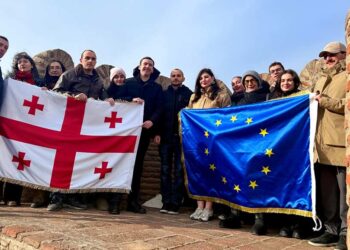The poor engagement of Civil Society Organizations (CSOs) in national climate policy design and formulation in Georgia is seen for a multitude of reasons, among them a lack of understanding of climate policy processes, institutions and actors, weak strategies for policy engagement, lack of valid data, inadequate use of evidence, poor communication approaches, and working in an isolated manner and a limited capacity over policy influence.
CSO engagement at the local level is even lower, but CENN has, since January 2021, been tackling this within the frames of the EU-supported Georgia Climate Action Project (GEOCAP), promoting civil society engagement in climate change policy design and implementation with the project’s partners KRDF, ACU, YPU and RLS-ADA. The project aims to strengthen the role of CSOs in tackling climate change by establishing a multi-stakeholder national platform and regional climate action groups (CAGs) on climate change, and by building trust and collaboration between state and non-state actors for increased climate change resilience and water security.
The project is based on the vision that a strong and competent civil society fosters self-reliance and resilience by supporting the state as the main provider of social services. The levels of civil society development in Georgia’s regions varies, as do the environmental challenges linked to the wellbeing of the population. CSOs in the regions tend to be more focused on service provision and do not engage in policy development, as they lack the necessary skills, incentives and resources to do so. Institutional stability and financial viability continue to be a challenge for CSOs due to limited access to information, networks, qualified professionals and other critical skills and resources.
“In order to increase resilience to climate change, the project aims to strengthen the role of civil society in the fight against climate change through the constructive engagement of stakeholders in the climate change sector,” says CENN Project Manager Nino Tevzadze.
The project empowers local CSOs in their actions for inclusive governance and equitable development and increases awareness and recognition of the role of CSOs in advocating for the protection of the environment and human health
The project is working nationwide, engaging with CSOs and other actors at national and local levels in 10 municipalities of the four target regions of Guria, Imereti, Kakheti, and Racha-Lechkhumi and Lower Svaneti. The project empowers local CSOs in their actions for inclusive governance and equitable development, demonstrates the benefits of innovative projects on water security contributing to climate change mitigation and the adaptation and protection of human health and the environment, as well as increasing awareness and recognition of the role of CSOs in advocating for the protection of the environment and human health. The project is strengthening some 50 CSOs. In all, up to 200,000 people will be reached in the 10 target municipalities.
“One of the directions of the project is the grant component, within the framework of which CSOs in the target regions have the opportunity to solve climate change-related issues existing at the local level with the support of the project,” Tevzadze tells GEORGIA TODAY. “We are glad that in this way we have the opportunity to encourage the implementation of innovative projects in the regions, which will contribute to climate change mitigation and adaptation to it, and to create successful examples in this direction, which could be replicated in the future.”
The project is working to:
1. Establish a multi-stakeholder National Climate Platform (NCP) and regional Climate Action Groups for facilitating engagement of civil society in formulation and implementation of climate-related strategies;
2. Facilitate multi-stakeholder participatory processes to identify and assess priority issues linked to climate change vulnerability and water security, and demonstrate the implementation of successful joint measures;
3. Offer financial support and technical capacity building to third parties for implementing innovative projects on water security contributing to climate change mitigation and adaptation, community resilience building and protection of human health and the environment;
4. Conduct awareness-raising activities promoting the role of civil society in advocating for protecting the environment, climate and human health, ensuring project visibility to encourage replication.
One of the beneficiaries of the sub-grant component is non-governmental organization Community Union “Sveri,” which is working in the Imereti region.
The aim of the Sveri project was to introduce a renewable energy solution, namely solar panels and the accompanying system, in the public school of Sveri (Chiatura municipality), and to support in its implementation. Further, the aim of the sub-grant is to raise the awareness of local community members of the village on climate change-related issues and the importance of renewable energy in the context of climate change.
GEORGIA TODAY spoke to Tamaz Tsutskiridze, Representative of the Community Union Sveri, and Acting Director of the Sveri Public School.
“Our partner organization informed us that CENN, within EU funded project, had announced a grant competition for CSOs to fight against climate change, and that 10 projects were to be funded.
We will implement steps and projects focused on energy efficiency and the green economy, so that the next generation can live in a healthy environment
“The solar panels have been installed. We just need to deal with some legalities concerning Energo Pro Georgia, after which, we can start using those panels,” he tells us.
“The benefits we expect from this project are that it will reduce utility costs for Sveri Public School and, at the same time, contribute to the health and improvement of the country’s energy. The use of free solar energy is an important innovation; no such project has been implemented in our municipality before. There is also interest from the public and it is possible for private individuals to follow our example and to purchase a similar micro power plant.
“In addition, the pupils also carefully observed the installation of these panels, which helps to raise their awareness about renewable energy in the context of climate change and energy efficiency and its importance,” Tsutskiridze says. “We are grateful to CENN for giving us the opportunity to implement a project of this scale. We are also grateful for the support we have had from the local government and the municipality. The contribution and determination of the school staff and the board of trustees is also worth mentioning.

“In the future, of course, we will try our best to implement steps and projects focused on energy efficiency and the green economy, so that the next generation can live in a healthy environment,” he notes.
Lia Kotrikadze, Co-founder of Community Foundation “Lotus,” a wind belt project in Ozurgeti, tells us that when the competition for grants was announced, she and her colleagues decided to participate in it to solve a very acute problem in their community – the cut and burned wind belt in Ozurgeti, which has resulted in serious problems for the population living nearby, especially during strong winds, both in terms of safety and soil erosion.
“We decided to take action to solve the problem and got involved in the CENN project,” she tells us.
“They liked our idea, after which I underwent training at the Bulachauri Green Center, among highly qualified professionals and trainers of CENN, who gave me very useful experience. After that, we received funding for our project and started the implementation of our initiative. The local City Hall actively supported us in this process, for which we’re very thankful.
“The arrangement of the wind belt and planting of seeds is almost completed, as is a fence which was put up to protect the young seedlings.
“Importantly, based on the agreement reached with the local authorities, the wind belt will be monitored by a specially allocated ranger, who will be responsible for it in times of drought, protecting it from animals, etc., until the trees are fully grown.
“The local population were actively involved in this process voluntarily. Information about our project was actively spread and contributed to raising awareness. Informative material was printed about the project, and flyers, made by pupils of the Ozurgeti public school eco-club, were distributed. As such, the project contributed to raising awareness among the young generation about the importance of mitigation and adaption to climate change and, in general, about protecting the environment. The project was very large-scale and interesting, and we’re grateful to the EU and CENN for giving us this opportunity.”
Source: CENN
By Katie Ruth Davies and Ana Dumbadze














